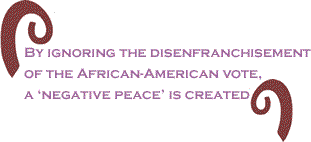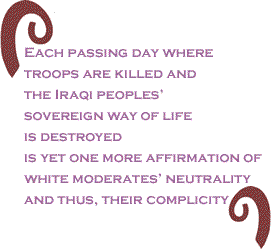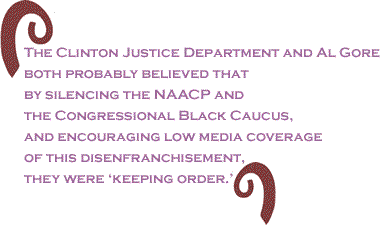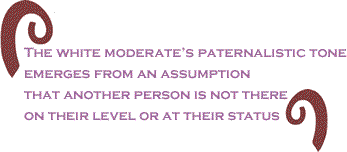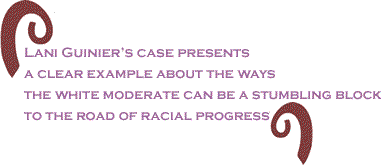
|
|||||||||||||||||||||
 |
|
Dr. Martin Luther King, Jr. died at the age of thirty-nine, on April 4, 1968, exactly one year after the same day he gave one of his most memorable speeches on April 4, 1967 at Harlem's Riverside Church, calling for an end to the war in Vietnam. As we approach the thirty-ninth anniversary of this most memorable speech on April 4, 2006, we need to revisit the forces in American society that he challenged, forces that King clearly identified by race: "the white moderate," so we can implore them to end the war in Iraq and address more pressing domestic needs. In this speech King says that "the hottest places in hell are reserved for those who in times of moral crisis maintain their neutrality." He said only three years earlier in his Letter From A Birmingham City Jail that "the Negro's greatest stumbling block in the stride toward freedom is not the White Citizen's Counciler or the Ku Klux Klanner, but the white moderate who is more devoted to ‘order' than to justice; who prefers a negative peace which is the absence of tension to a positive peace which is the presence of justice." We need to study how the Iraq invasion reveals today the same battles that were fought in the 1960s through the lens of what King describes as the "white moderate." In his Letter From A Birmingham City Jail, King was responding to eight Alabama clergymen who wrote him a letter saying his demonstrations against segregation were "unwise and untimely." That could be the same reply many white moderates today would have if any drastic measures were taken against the war. We must also identify the white moderates of our time, mainly the Democratic Party, not for the purpose of attacking them, but to implore them by vocal persuasion, by e-mail, or by other nonviolent protest, to move them out of their neutrality and demand withdrawal from Iraq. Each passing day where troops are killed and the Iraqi peoples' sovereign way of life is destroyed is yet one more affirmation of their neutrality and thus, their complicity and contribution to the Iraq War. To better understand how to approach the white moderate power structure, we must first realize how King's criticism of the moderates of his time is not different at all from a criticism of our time. When King says that "the white moderate is more devoted to ‘order' than to justice" he is clearly referring to both the actions of Bill Clinton and Al Gore after the 2000 Presidential Election. In a 2001 article called "Civil War 2000" published in The Black Scholar, Charles P. Henry writes: "Kweisi Mfume, president of the NAACP, reports that his organization begged the Clinton Justice Department to intervene in the voting irregularities that occurred in Florida on Election Day. Mfume says, ‘the Justice Department turned away.'' After the elections, Mfume asked the Justice Department to hold hearings – ‘the Justice Department just looked away.' Despite the lack of response by Clinton's Justice Department, he was given an ‘image' award by the NAACP in 2001! How do we explain what Mfume calls the cool, cold, and callous response of the Justice Department?" Instead of awarding white moderates for suppressing or silencing the voices against disenfranchisement and injustice, their feet need to be held to the fire so they address the pressing domestic issues of today like Iraqi withdrawal.
In one of the first scenes in the 2003 film, Fahrenheit 9/11, Al Gore and the entire U.S. Senate rather stoically and sternly denied the Congressional Black Caucus their right to challenge the 2000 election results when all they needed was a signature from one senator. Did they believe they were "keeping order" by doing this? Also, Al Gore moved assiduously to silence not only the NAACP when they were trying to sue the state of Florida for disenfranchising black voters, he also asked that the Congressional Black Caucus be silent and not be too vocal about the racist disenfranchisement of black votes in the 2000 election. This disenfranchisement was racist because the company that was hired, Choicepoint, to create voting rolls in Florida, improperly and incorrectly identified a disproportionate number of African-American registered voters as felons. The Clinton Justice Department and Gore both probably believed that by silencing the NAACP and the Congressional Black Caucus, and encouraging low media coverage of this disenfranchisement, they were "keeping order." Why might they feel that silencing African-American organizations would be "keeping order"? Might he believe that their voice or, African-Americans themselves are inherently disorderly? If so, we need to consider the nonviolence of King's protest, and notice its similarities in the way the NAACP and the Congressional Black Caucus used it to demand justice, and end racist notions about blacks' petitioning their constitutional rights as inherently being "too hostile, controversial" or "too disorderly." King later says in the Letter that "I had hoped the white moderate would understand that the present tension of the South is merely a necessary phase of the transition from an obnoxious negative peace." There is no question that by ignoring the disenfranchisement of the African-American vote that a "negative peace" is created. As much as it angers many voters, the media discourse about the 2000 Presidential election has ended. Is the current dearth of talk about this disenfranchisement what Gore and Clinton hoped? Had they in fact achieved the positive peace they wanted? Possibly so, especially when we remember the many ways that the "white moderate" commit the most egregious acts of discrimination, because they thought that they were really helping the cause by silencing African-Americans voices protesting their disenfranchisement. King later describes the "white moderate" as one who "constantly says, ‘I agree with you in the goal you see, but I can't agree with your methods of direct action"; [He is one] who paternalistically feels that he can set the timetable for another man's freedom; who lives by the myth of time and who constantly advised the Negro to wait until a more convenient season."
Both Clinton and Gore indirectly advised African-Americans to "wait for another season" when they decided to ignore their disenfranchisement. They certainly needed to hear King's Letter when he writes: "we who engage in nonviolent direct action are not the creators of tension. We merely bring to the surface the hidden tension that is already alive." The NAACP and Congressional Black Caucus would not have created tension if they were given valid support by Clinton and Gore to voice their disenfranchisement: they were bringing to the surface the "hidden tension that is already alive." Of course, we can safely assume that Clinton and Gore probably did not support the NAACP and the Congressional Black Caucus because they had a general fear of seeming "partisan," but this fear also has very troubling racist assumptions. Why would genuinely racist African-American disenfranchisement be called as a "Democratic," or "partisan" or "political" issue? Why is "civil rights" today seen as a political issue? What does such a characterization imply about the American government? As Political Science Professor Ronald Walters writes in his White Nationalism, Black Interests:
These racist attitudes and assumptions about civil rights being unnecessary are allowed to circulate only because race is actively excluded in the American political discourse, so anything normal is anything white. This speaks to what King says when he describes the white moderate as "paternalistic." Walters goes further than King when he says that one of the forms of White supremacist ideology is "paternalism, whose adherents considered Blacks childlike." Moreover, what King teaches us is that the white moderate's paternalistic tone emerges from an assumption that another person is not there on their level or at their status. We know in King's time many citizens believed that others were not "on their level," but in 2006, we ought to take these lessons from Dr. King and fight even the new forms of racism that exist not only in the actions but in the assumptions of white moderates like Gore and Clinton. A "new racism" is best described by Patricia Hill-Collins in her recent 2004 book Black Sexual Politics, where she says that "the new racism relies more heavily on the manipulation of ideas within mass media. These new techniques present hegemonic ideologies that claim that racism is over. They work to obscure the racism that does exist, and they undercut anti-racist protest…the new racism reflects sedimented or past-in-present racial formations from prior historical periods."
There is no question that today's white moderate activities by both Gore and Clinton reflects deep-seated, or "sedimented" assumptions that aim to "undercut anti-racist protest" by the NAACP and the Congressional Black Caucus about the 2000 disenfranchisement. More interesting are the ways that Clinton treated his female African-American nominees to his government posts. First, Clinton nominated Joycelyn Elders to the position of U.S. Surgeon General in 1993. When Elders was told that she was trying to avoid the issue of masturbation by ABC News anchor Ted Koppel, Dr. Elders writes: "If I was going to say something, I wanted to say it explicitly. ‘In regard to masturbation,' I told him, ‘I think that is part of human sexuality, and perhaps it should be taught.'" Dr. Elders suffered huge backlash from the American media for these comments, from Clinton's cabinet members, and Clinton himself. She writes that Clinton says, "I'm sorry all this is happening. But I hear there are all these remarks going on, and we can't have them. I want you to get your resignation into Panetta's office this afternoon." Elders presents later the political reasons Clinton demanded her resignation and defends him, writing "I still don't think that the President himself would have wanted me to leave, nothing would have come of it. But as Donna Shalala liked to say, I was never her choice, and once the President's chief of staff decided I was a liability, it was just a matter of finding the opportunity." This situation certainly reveals the way African-American leaders can be cast as a "liability" not only by their association, but by their comments and frankness – a frankness which their situation might demand more than non-African-Americans in general. Dr. Lani Guinier was nominated to be Clinton's Assistant Attorney General for Civil Rights, however Clinton abruptly withdrew her nomination just before her nomination hearing, without clearly expressing his reservations. Dr. Guinier writes in her book Lift Every Voice about how upset she was when Clinton characterized her views as "anti-democratic." She writes "he privately listened and then publicly called me names… I had left the Oval Office without a clue as to what the president was really thinking. He had hinted at but had been unable to state the ‘positions' in my legal writings ‘with which [he] did not agree…Yale professor Harlon Dalton [said], ‘her senate hearing would have been a conversation about what democracy looks like in a multicultural society in the 1990s and I think that's a conversation we need to have. Instead, the Senate and the president ran away from it.'" Here is another example where Clinton and the Senate perhaps felt they were "keeping order" in society by avoiding this conversation about what democracy looks like in a multicultural society. Here in a very significant way, Clinton pandered to conservative interests. Dr. Guinier later confesses that "I felt humiliated by the president, my friend, not because he had buckled in the face of pressure but because he justified his action by mischaracterizing who I am and what I have stood for." Both King and Guinier were mischaracterized: King as a "rabble rouser" and Guinier as a "quota queen." Both fight these mischaracterizations by first identifying them and understanding their attempts to redress these mischaracterizations in a nonviolent way. King corrects notions that he creates tension while Guinier does the same thing. However Guinier's case presents a clear example about the ways the white moderate can be a stumbling block to the road of racial progress even when they feel they are helping the cause. As History Professor Dr. Mary Frances Berry tells in my August 2005 interview with her, Clinton appeased the Congressional Black Caucus's fury over his withdrawal of Lani Guinier by appointing Dr. Berry as chair over the U.S. Commission on Civil Rights in 1995. Unfortunately however, this was a commission that was completely branded as "partisan" not only by the Bush Administration but also by the American media. Therefore, their hearings on the 2000 Presidential Election voter disenfranchisements were not covered by any major media.
Hillary Clinton also shows many characteristics of a white moderate, who politically resembles Elizabeth Cady Stanton, a nineteenth century social activist who said, "I will cut off this right arm of mine before I will ever work for or demand the ballot for the Negro and not the woman." In Clinton's tenure as U.S. Senator from New York, she has built a questionable, romanticized image among African-Americans, evidenced from the applause she garnered at Coretta Scott King's funeral. African-Americans applauded when one audience member yelled her approval for Clinton to be president. The applause for Mrs. Clinton certainly betrayed their ignorance of how Mrs. Clinton's votes in the Senate have repeatedly worked against working-class issues, such as her support for the illegal invasion and occupation of Iraq. Her voluntary alienation from Harry Belafonte also leaves very disturbing impressions about the lengths she might go to advance her own political career, especially since Belafonte was respected and had such a close friendship with Dr. King. Democratic senators such as Hillary Clinton and Barack Obama seriously hurt the anti-war cause by repeatedly voting to authorize funding for it. They are also contributing to the deaths of more lives by not at least making an important statement or symbol by voting NO on at least one of these huge military bills. Instead, they act as white moderates, who expect unadulterated, instinctive support from the African-American community and still get it, to some degree. So we see thus far that the white moderate, operates in three basic ways: by ignoring the non-white presence, by paternalizing their own presence (or devaluing others' presence), and by mischaracterizing others'. Bill Clinton has done the first most often, but has certainly done the third; both Gore and Mrs. Clinton seem most safe within the first way of operating. U.S. Representative Dennis Kucinich exposed Howard Dean as a white moderate in last year's An Open Letter to Howard Dean. Kucinich's quote of Dean as saying "Now that we're there [in Iraq] and we can't get out…" contains a false assumption or mischaracterization that "we can't get out." Says who? George W. Bush? Howard Dean? Absolutely now. We can get out. How do we know we can't get out if we do not try to nonviolently protest the situation so that the U.S. government can bring the troops home? Kucinich reminded Dean that he was popular because of all the 2004 presidential candidates, he was the only anti-war candidate. Now that Bush was "re-elected," in 2004, he has ended his calls for withdrawal from Iraq and does so based on his own beliefs that "we can't get out," by basically mischaracterizing the situation in Iraq, like the Alabama clergymen mischaracterized King as the "creator of tension." The character flaws of all white moderates are common to all humans, however it is essential to identify these flaws in white men of power, such as Bill Clinton and Al Gore, because they have the clout and the ability to nonviolently protest, or join others in doing so to end racist actions that perpetuate the cycle of violence that the Iraq War continues. The fact is clear that the "white moderate" has a significant stranglehold on the Democratic Party because many House leaders and leaders within the Democratic Leadership Council, which Clinton founded, do their best to silence or delay the voices within the U.S. House that call for immediate withdrawal of troops. As David Swanson wrote in an article for BlackCommentator.com, those voices that called for immediate withdrawal happened to be disproportionately black, while those who did not call for immediate withdrawal happen to be disproportionately white. Do the racial assignments of those calling for immediate withdrawal matter? Absolutely. Especially when the billions of dollars demanded by the executive branch for the Iraq war sap funding for pressing domestic needs disproportionately affecting Americans by race. House Democratic leader Nancy Pelosi's removal of Cynthia McKinney's seniority and her silencing of Ms. McKinney's calls for immediate withdrawal last year are very similar to the ways that Alabama clergymen tried to silence Dr. King on calling not only for integration, but later for the withdrawal from the Vietnam War. It is important to understand that there are stronger white moderate forces even higher than Nancy Pelosi in the Democratic Leadership Council that aim to squelch or silence other calls for withdrawal from the U.S. House. Representative Maxine Waters from California has organized an "Out of Iraq" caucus and has said to me she joins John Murtha's call for withdrawal, and aims to have the beginning of the withdrawal of U.S. troops by the end this year. As citizens, we need to call U.S. Representatives such as Cynthia McKinney and Maxine Waters, thank them for continuing Dr. King's legacy of resistance, and call white moderates as well, asking that they do their best to begin withdrawal of our troops from Iraq. Rhone Fraser is an independent journalist who writes and produces for Pacifica WBAI radio's Arts Magazine Program. He is currently a graduate student who has recently written a documentary play on the life of civil rights activist Fannie Lou Hamer and can be reached at [email protected]. |
|
| Home | |
Your comments are always welcome. Visit the Contact Us page to send e-Mail or Feedback or Click here to send e-Mail to [email protected] e-Mail re-print notice
If you send us an e-Mail message we may publish all or part of it, unless you tell us it is not for publication. You may also request that we withhold your name. Thank you very much for your readership. |
|
| March
16, 2006 Issue 175 |
||||||||||||||
|
||||||||||||||
|
||||||||||||||
| Printer Friendly Version in Plain Text or PDF format. Download free Adobe Reader. | ||||||||||||||
 |
||||||||||||||
 |
||||||||||||||
 |
||||||||||||||
| |
||||||||||||||
| |
||||||||||||||






















